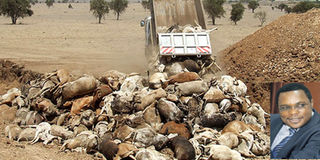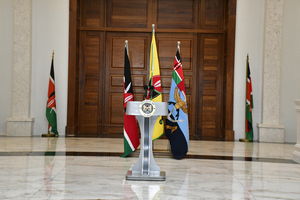Drought wipes out herd worth Sh64bn

Abel Mosingisi |NATION
A truck dumps cattle carcasses in Athi River. Hundreds of cattle have died at the Kenya Meat Commission while awaiting slaughter. Inset: Livestock Development permanent secretary Kenneth Lusaka
What you need to know:
- Kenya’s arid and semi-arid areas have lost a quarter of their Zebu herd as 8m animals dead, says government
The drought has decimated Kenya’s livestock, killing animals worth more than Sh64.2 billion, according to the government.
A quarter of the country’s Zebu herd of 14 million animals in arid and semi-arid areas is lost and the worst is possibly yet to come.
Livestock Development permanent secretary Kenneth Lusaka told the Nation on Sunday that the worst hit are cattle. Some 3.5 million head of cattle, with a market value of Sh52 billion, are reported to have died due to lack of water and pasture, followed by 2.7 million goats (Sh 6.7 billion) and 2.5 million sheep worth Sh5 billion.
Mr Lusaka said the sheep and goats were lost in Wajir, Mandera, Garissa and Turkana counties, adding that the drought had claimed about 8.7 million animals and the ministry needed Sh2 billion to avert a catastrophe.
“We have been directed to relocate Sh389 million into emergency off-take in the worst areas so to salvage what we can but we acknowledge it is not enough,” he said.
The ministry has since January been buying livestock from drought-stricken areas together with the Agricultural Finance Corporation and aid agencies.
More than Sh1.1 billion has been spent in 75 arid areas like Mandera, Wajir, Garissa, Machakos, Kitui, Makueni, Isiolo, Marsabit, Turkana, West Pokot, Baringo, Elgeyo Marakwet, Samburu, Laikipia, Narok, Kajiado, Taita Taveta, Kwale and Tana River.
“We have slaughtered 9,278 cattle, 26,455 goats, 12,397 sheep, 95 camels and six donkeys. We have also through Agricultural Finance Corporation pumped Sh422 million which has reached 32,500 livestock farmers,” said the PS.
But Mr Lusaka said the deaths could have been lower if the farmers had taken to the project fast.
“Farmers refused to sell their animals to us until it was too late. Otherwise we also sent early warning systems and our officers went around informing them about the programme.”
He said Sh300 million had been set aside for slaughter houses in Wajir, Garissa and West Pokot.
He said the government was using district steering committees to purchase and slaughter weak animals that could not be transported to the Kenya Meat Commission (KMC) and distribute the meat as relief supplies to the locals.
“In the initial plan, Sh200 million was released to 64 districts and we have dispatched a team to assess the success of the programme as we explore long lasting ways of assisting such farmers.”
He said the ministry had allocated a further Sh192 million to the KMC to buy animals directly from farmers.
Another Sh427 million has been given to the Agricultural Finance Corporation for ranchers to buy weak animals for fattening before they are sold to KMC and other meat dealers.
In the long-term, Mr Lusaka said, the ministry would develop an enterprise fund to cushion farmers against losses during dry spells.
The Treasury released the first instalment of Sh400 million this financial year for the kitty expected to reach Sh5 billion annually.
“It will operate as a revolving fund. It is a more proactive measure,” said Mr Lusaka.
Mr Samuel Loburon from Swam in West Pokot said most residents had relocated to Uganda which was not as badly hit by the drought.
“We joined our fellow Pokots in the neighbouring district and they welcomed us with open arms. So the offtake programme did not come to this end because we lost no cattle,” said Mr Loburon.
But in the neighbouring Pokot Central District, Mr Stephen Lomongin said the area was hard hit by drought.
“So far, our animals have been purchased twice and we hope the government will continue monitoring the situation to ensure we don’t suffer losses, even as the weather patterns have now changed for the better,” said Mr Chepkoben Ngoriamuna.




